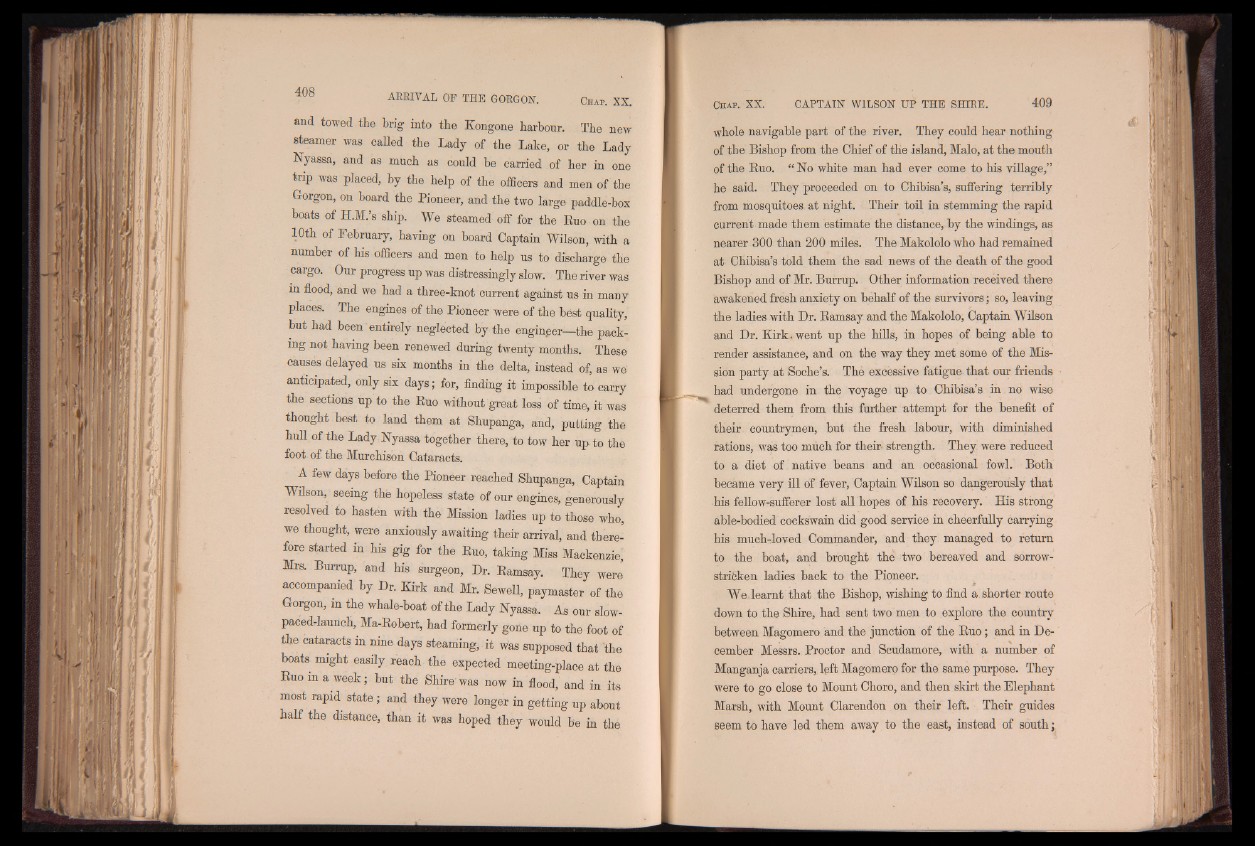
and towed the brig into the Kongone harbour. The new
steamer was called the Lady of the Lake, or the Lady
Nyassa, and as much as could be carried of her in one
trip was placed, by the help of the officers and men of the
Gorgon, on board the Pioneer, and the two large paddle-box
boats of H.M.’s ship. We steamed: off for the Ruo on the
10th of February, having on board Captain Wilson, with a
number of his officers and men to help us to discharge the
cargo. Our progress up was distressingly slow. The river was
in flood, and we had a three-knot current against us in many
places. The engines of the Pioneer were of the best quality,
but had been entirely neglected by the engineer—the packing
not having been renewed during twenty months. These
causes delayed us six months in the delta, instead of, as we
anticipated, only six days ; for, finding it impossible to carry
the sections up to the Ruo without great loss of time, it was
thought best to land them at Shupanga, and, putting the
hull of the Lady Nyassa together there, to tow her up to the
foot of the Murchison Cataracts.
A few days before the Pioneer reached Shupanga, Captain
Wilson, seeing thè hopeless state of our engines, generously
resolved to hasten with the Mission ladies up to those who,
we thought, were anxiously awaiting their arrival, and therefore
started in his gig for the Ruo, taking Miss Mackenzie;
Mrs. Burrup, and his surgeon, Dr. Ramsay. They were
accompanied by Dr. Kirk and Mr. Sewell, paymaster of the
Gorgon, in the whale-boat of the Lady Nyassa. As our slow-
paced-launch, Ma-Robert, had formerly gone up to the foot of
the cataracts in nine days steaming, it was supposed that the
boats might easily reach the expected meeting-place at the
Ruo m a week; but the Shire was now in flood, and in its
most rapid state ; and they were longer in getting up about
half the distance, than it was hoped they would be in the
whole navigable part of the river. They could hear nothing
of the Bishop from the Chief of the island, Maio, at the mouth
of the Ruo. “ No white man had ever come to his village,”
he said. They proceeded on to Chibisa’s, suffering terribly
from mosquitoes at night. Their toil in stemming the rapid
current made them estimate the distance, by the windings, as
nearer 300 than 200 miles. The Makololo who had remained
at Chibisa’s told them the sad news of the death of the good
Bishop and of Mr. Burrup. Other information recéived there
awakened fresh anxiety on behalf of the survivors; so, leaving
the ladies with Dr. Ramsay and the Makololo, Captain Wilson
and Dr. Kirk, went up the hills, in hopes of being able to
render assistance, and on the way they met some of the Mission
party at Soche’s. The excessive fatigue that our friends
had undergone in the voyage up to Chibisa’s in no wise
deterred them from this further attempt for the benefit of
their countrymen, but the fresh labour, with diminished
rations, was too much for their- strength. They were reduced
to a diet of native beans and an occasional fowl. Both
became very ill of fever, Captain Wilson so dangerously that
his fellow-sufferer lost all hopes of his recovery. His strong
able-bodied cockswain did good service in cheerfully carrying
his much-lov-ed Commander, and they managed to return
to the boat, and brought thè two bereaved and sorrow-
striòken ladies back to the Pioneer.
We,learnt that the Bishop, wishing to find a shorter route
down to the Shire, had sent two men to explore the country
between Magomero and the junction of the Ruo ; and in December
Messrs. Proctor and Scudamore, with a number of
Manganja carriers, left Magomero for the same purpose. They
were to go close to Mount Choro, and then skirt the Elephant
Marsh, with Mount Clarendon on their left. Their guides
seem to have led them away to the east, instead of south ;